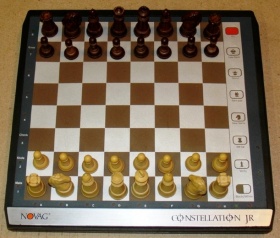Novag Constellation Junior: Unterschied zwischen den Versionen
Erscheinungsbild
Keine Bearbeitungszusammenfassung |
Keine Bearbeitungszusammenfassung |
||
| Zeile 3: | Zeile 3: | ||
| Titel = Novag Constellation Junior | | Titel = Novag Constellation Junior | ||
| Bild = [[Bild:Constellation_JR.jpg|center|280px]] | | Bild = [[Bild:Constellation_JR.jpg|center|280px]] | ||
| Bild2 = [[Bild:Levelinfo Novag Constellation Junior.jpg|center| | | Bild2 = [[Bild:Levelinfo Novag Constellation Junior.jpg|center|380px]] | ||
Levelinfos | Levelinfos | ||
| Hersteller = [[Novag]] | | Hersteller = [[Novag]] | ||
Version vom 5. Januar 2015, 00:55 Uhr
| Novag Constellation Junior | |||
|---|---|---|---|
 |
|||
| Hersteller | Novag | ||
| Markteinführung | 1985 | ||
| CElo | |||
| Programmierer | Dave Kittinger | ||
| Prozessor | Takt | RAM | ROM |
| 6301 | 6 MHz | 512 Byte | 4 KB |
| Rechentiefe | BT-2450 | BT-2630 | Colditz |
| Halbzüge | |||
| Bibliothek | ca. 100 Varianten | ||
| Display | |||
| Spielstufen | 8 | ||
| Zugeingabe | Drucksensoren | ||
| Zugausgabe | 16 Randdioden | ||
| Einführungspreis | 150 € | ||
| Prozessortyp | 8 Bit Singlechip | ||
| Stromversorgung | Netz | ||
| Maße | 26 x 24,3 x 2,3 cm Spielfeld 20 x 20 cm | ||
| Verwandt | Novag Presto | ||
| Sonstiges | |||
| kein Permanent Brain, löst bis zu Matt in 3 | |||

